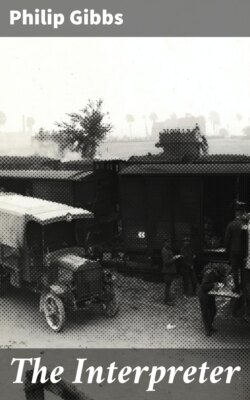Читать книгу The Interpreter - Philip Gibbs - Страница 7
На сайте Литреса книга снята с продажи.
5
ОглавлениеTable of Contents
John was alone in his house. Judy and her child and Mrs. Barton had gone off to the Surrey village of Spurfold. He had hired a car for them and had helped them to get away with innumerable small packages and several trunks. At four o’clock that afternoon he had to do a broadcast talk, and at nine o’clock in the evening he spent some time in a shelter under the Adelphi arches, where a group of pacifists were running a canteen for the real derelicts of London life, too verminous to be allowed in other shelters, and the old drunks and disorderlies who had been incurable until by some miracle these Christian pacifists lifted some of them above the slime into which they had fallen. In spite of their reputation, he found them entertaining and not at all inhuman. He laughed and joked with them, though again, at the back of his mind, he was desperately worried about Anne, who was on duty in the neighbourhood of the docks. He had an interesting talk with an old tramp who was a bit of a philosopher, and a merry old fellow who knew all the roads and field paths of England and all its doss houses. He laughed and joked with them though London was being bombed again and Anne was out in it. He was laughing when Anne was killed.
He was home shortly before midnight. Chelsea was quiet, but there was a red glow in the sky eastwards, and the guns were firing. Outside his house there were little heaps of broken glass. He would have to be careful about the black-out. There were great rents in the curtains and some of them hung in tatters.
He groped through the hall and upstairs without switching on a light, and then turned on a torch in the drawing room where he had blocked up the windows with cardboard after seeing Judy and his mother off to the Surrey village.
Then he switched on a light and stood motionless for several minutes. The full horror of this war was in his thoughts. He had never imagined anything like this before it happened. London under bombardment. Walking in its ruins. Millions of civilians abandoning their homes and sleeping underground. The extraordinary mixture of gay courage and blind fear, and cockney laughter, and the mutilation of women and children. He had laughed quite a lot that night under the Adelphi arches. There was a world of agony in Europe. Over the tape machine in his office that evening the record of it was told in brief messages. Russians and Germans were dying in heaps in the snow. Hunger was spreading in Occupied France. There were mass executions in Servia and Czechoslovakia. Typhus was coming westwards. What a world, and what ghastly mistakes and follies had led to it. The leaders of England had been stricken blind. The leaders everywhere.
John Barton, who had been the European correspondent of an American paper, and who had seen its menace coming, looked back to the days before the war when he had been reporting history as it passed. He had backed Chamberlain at Munich. This was held against him now by American critics. He had been dead wrong. Everybody had been led up the garden path to the deep pit beyond. They were all in a deep pit now. How could England win? After the fall of France. After Crete. Their only hope lay in Russia, where the Germans were getting close to Moscow.
John Barton came out of his brown study and moved across the room. He stooped to pick up something. It was one of the chessmen which had been flung across the floor by the explosion. It was the white queen with which Anne had been playing.
The telephone bell was ringing in his study. It might be Anne, he thought, ringing him up from the underground station at Aldgate, as she sometimes did.
He hurried out of the drawing room and went into his own room at the back of the house where it was safe to turn on a light.
“Hullo,” he said, picking up the receiver. “Is that you, Anne?”
For a moment nobody spoke, but then a woman’s voice answered.
“Is that Mr. John Barton?”
“Yes. What is it?”
There was another hesitation before the woman’s voice spoke again.
“I’m afraid I have ...”
She hesitated again and then spoke with a kind of breathlessness.
“I’m sorry.... I have to give you bad news.... Can you take it?”
“About Anne?” asked John.
His voice sounded quite calm, but he suddenly felt faint and sick, and he was possessed by panic.
“I’m dreadfully sorry,” said the voice. “Lady Anne has been killed. She was very brave. We all worshipped her.”
He heard a sob at the end of the telephone.
“Where is she?” asked John.
His voice was only a little harsh.
There was another hesitation.
“There is nothing left of her. It was a big explosion. We cannot recover her body. Please accept our very deep sympathy.”
“Thank you,” said John.
He was quite polite. Somebody gave him deep sympathy because Anne had been killed. He said: “Thank you” as though someone had given him a cup of tea.
He dropped the receiver. There was something in his hand. He wondered what it was. It was the white queen with which Anne had been playing last night. He stared at it for a moment as if surprised to find it in his hand.
Then he gave a great cry, as though his soul had been torn out of his body.
